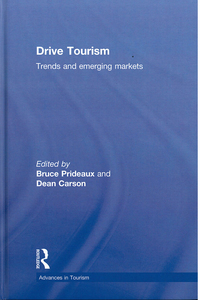Mapping the road: developing the cognitive mapping methodology for accessing road trip memories
Pearce, Philip, and Thomas, Michael (2011) Mapping the road: developing the cognitive mapping methodology for accessing road trip memories. In: Prideaux, Bruce, and Carson, Dean, (eds.) Drive Tourism: trends and emerging markets. Advances in Tourism . Routledge, Milton Park, UK, pp. 263-277.
![[img]](https://researchonline.jcu.edu.au/16474/1.hassmallThumbnailVersion/book_cover-Drive_Tourism.jpg)
|
Image (JPEG) (Book Cover)
- Cover Image
Download (1MB) |
|
|
PDF (Published Version)
- Published Version
Restricted to Repository staff only |
Abstract
[Extract] The primary goal of this chapter is to breathe fresh energy into the topic of cognitive mapping as a tool to access tourists' memories and learning. The topic of cognitive maps has a rich history and there are some effective instances of its use in recording tourists' post-experience recollection of cities. There are also some promising but sporadic forays into understanding travellers' journeys and routes using the 'draw a map' technique, which is one component of the tool box in cognitive mapping research. It can be argued, however, that the full potential of the approach has yet to be realised, and the intent of this chapter is to advocate its wider and balanced use. Initially, the chapter will review, albeit briefly, the main themes in cognitive mapping studies. Its use in tourism studies in particular will be considered. These background considerations will lead to the ways in which cognitive mapping research can be applied to studies of drive tourism, and instances of such applications will be presented. Some of this work is unpublished and presented here for the first time. A portion of the work comes from doctoral theses written about Australian settings, but recent scholarly application of the ideas to setrings in other continents will also be noted. In considering the applications of the mapping approach to drive tourism, the focus will be on three topics: studies of visitors conceptualising a region, analysis of visitors recalling small towns through which they drive and travellers remembering a full day's driving route. Key issues in collecting mapping data, in analysing such data and in reporting the information will be highlighted as a way of energising researchers to adopt the approach for further studies in drive tourism. Many of the points raised are also applicable to other settings where accessing the memories tourists have of places is of paramount importance. Overall, the approach represents an emic-based and experiential contribution to analysing drive tourism. It will be noted that the application of this knowledge to marketing and interpretive efforts for scenic highways and route planning can be considerable.
| Item ID: | 16474 |
|---|---|
| Item Type: | Book Chapter (Research - B1) |
| ISBN: | 978-0-415-49149-5 |
| Date Deposited: | 23 Jun 2011 02:31 |
| FoR Codes: | 15 COMMERCE, MANAGEMENT, TOURISM AND SERVICES > 1506 Tourism > 150606 Tourist Behaviour and Visitor Experience @ 100% |
| SEO Codes: | 90 COMMERCIAL SERVICES AND TOURISM > 9003 Tourism > 900302 Socio-Cultural Issues in Tourism @ 100% |
| Downloads: |
Total: 318 Last 12 Months: 2 |
| More Statistics |



